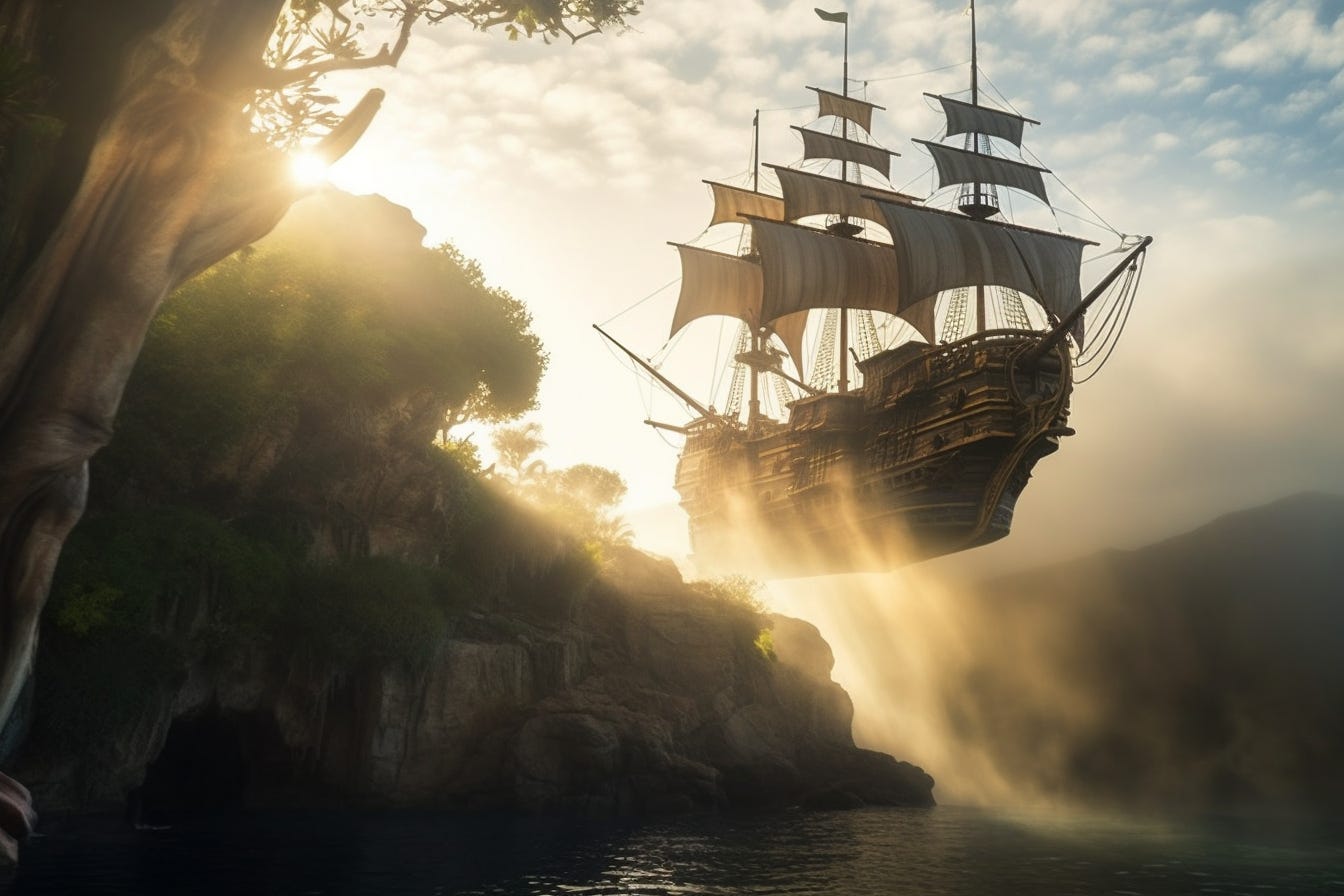I don’t want to grow up.
I never have. I once wrote in my diary that I wanted to stay 13 years old forever. I think I would still choose that today if I could.
I can see so many of my peers making peace with their aging, but I don’t want to make peace with mine. I think youth is one of the most beautiful and precious things, and I don’t want to lose it.
Childhood is a time of blissful naivete, then we grow older and disillusioned. We become burdened and disgruntled. We become cynical and stuck in our ways. We lose the magic.
I think childhood is preferable to that.
Perhaps that’s why Peter Pan’s Neverland always struck me as a utopia, a space between awake and dreaming, where you can always be a little kid and have fun.
And kids do have more fun. Just watch them for a minute.
Peter Pan was inspired by such a set of children. The author of the original play, J.M. Barrie came across the Llewelyn Davies boys in Kensington Park where he used to walk his St. Bernard. The boys would act out wildly imaginative pirate adventures, which Barrie eventually captured in a collection of photographs entitled The Boy Castaways of Black Lake Island.
Inspired by their adventures, even as their father died followed shortly by their mother, Barrie saw their imagination as a vital and beautiful force. Barrie told the older boys that babies were birds before they were born—parents captured them and put bars on nursery windows to keep them from flying away. He told them their younger brother, Peter, was still young enough to fly.
Eventually, these stories became Peter Pan, and the story is beautifully depicted in the Broadway musical Finding Neverland, one of my favorites.
Peter Pan’s Neverland always struck me as a utopia, a space between awake and dreaming, where you can always be a little kid and have fun…And kids do have more fun. Just watch them for a minute.
When the boys’ mother passed away, she left them to Barrie and her mother. Barrie was criticized by other adults for his adoration of those children. Such a proclivity could only mean he was a pedophile. He wasn’t. He simply thought children had something adults lacked. He simply thought they maintained a sense of wonder we forgot.
“He was an innocent,” the youngest of the Llewelyn Davies brothers, Nicholas explained. “Which is why he could write Peter Pan.”
I want to maintain my innocence, too. I see the childlike wonder fading in so many of the adults around me. They look right past the happy and beautiful things and see only the dreary day. Children don’t see the world that way, they look right through the rain and see the puddles they can splash in.
Disney’s most recent (and best) adaptation of the play, Peter and Wendy, brought this into stark relief for me. Not only is the film the most beautiful depiction of Neverland I’ve ever seen, but we finally get to learn why Captain James Hook became the way that he did. He used to be Peter’s best friend, he used to be a lost boy, but then they got into an argument and he went and grew up.
Peter and Hook now live in the same beautiful land, but they see it differently. So does Tiger Lily and her tribe, who have been given a welcome and beautiful update in this tale. The world looks different depending on which vantage point you’re viewing it from. To the lost boys, life is an adventure to be had. To Hook, it is a battle already lost.
Wendy, enters into the in-between. She is on the verge of adulthood and doesn’t want to be, she still wants the adventure.
So do I.
But as we grow older this is a hurdle we all must face. We must learn the facts about the world then determine if we can still see them with wonder. The adults don’t want us to. They correlate the optimist with ignorance, and call the pessimist a realist. Someone who sees the world in a positive light must be ignoring the problems, we’re told.
I want to maintain my innocence, too. I see the childlike wonder fading in so many of the adults around me. They look right past the happy and beautiful things and see only the dreary day. Children don’t see the world that way, they look right through the rain and see the puddles they can splash in.
But someone who sees the world in a negative light is ignoring the positives. Who is the more ignorant?
I think the only difference between a dystopian thinker and a utopian one is that we’re looking at the same facts and seeing different outcomes. Perhaps that’s why so many utopian writers settle in the children’s section. C.S. Lewis’ Narnia, Lewis Carroll's Wonderland, and Barrie’s Neverland were never devoid of problems, they simply weren’t held back by them. They still saw the beauty they could create in this world. And that is much too sophisticated for the grown ups to understand.
It’s not blind optimism, the ability to dream, and I do it regularly. But it is perhaps a childish thing. How strange it is to tell people my dreams—that I want to move to Europe, for example—and have people respond only with gravity. But you don’t speak the language. What are you going to do about health insurance? What are you going to do about jobs? How are you going to get visas? Who will water your plants?
These are easily surmountable things, but for many, they are insurmountable. They put rocks on our wings and weigh us down. When we are stuck in reality we can only use reality to get out.
But children have another option: imagination. Ask any child the dreams for their lives and they will give you much bigger ones than we could come up with ourselves. And it is only there that we can truly shift things. It is only with “possibility” that things can become “probability.”
In Finding Neverland, it is ultimately the children who turn extraordinarily dark moments into beautiful and happy ones. The facts are the same for everyone, we realize, but the children have an additional superpower. It’s brought to a head in the song, “Play,” as the adults remember their childhoods and transform their mindsets in the process.
“You got lost somewhere along the way, you’ve forgotten how to play every single day,” one man realizes.
But he is learning the antidote: “The world is so mysterious and wild, when you start to see it through the eyes of a child.”
The problems are still there, mind you. I’m not suggesting any of us put our heads in the sand and imagine them away. But what is the better thing to do with them: To complain about what’s gone wrong? Or to imagine a way out? As the Cheshire cat puts it in Alice’s Adventures in Wonderland: “Imagination is the only weapon in the war against reality.”
Do you believe in the impossible? Perhaps you don’t. Carroll’s Alice is on the verge of forgetting such things herself. When she starts crying in the woods, the Queen of Hearts asks her to reconsider.
“There's no use trying,” she says. “One can't believe impossible things.”
“I daresay you haven't had much practice,” says the Queen. “When I was your age, I always did it for half-an-hour a day. Why, sometimes I've believed as many as six impossible things before breakfast.”
I think when we grow up, we shouldn’t throw out our youth. I think we should keep it with us as we go. Because we will come to see the way of the world, but we’re still capable of seeing the magic in it.
Gwynyth Paltrow recently said she’s looking forward to settling into her “crone years,” referring to the pagan phases of a woman’s life—from maiden to mother to crone—symbolically represented by heaven, earth, and the underworld. The idea is that as we age, we settle into the wizened underworld, and she is not the only one to make peace with that.
But I don’t want to. I’m gripping my maiden by her dress and dragging her heaven into my old age. Not in looks, because I love the look of old crinkly things, but in mind. Because I think the dreamers have more to say about the world than the nihilists do. We can still see it for what it is, even as we plant a garden in it.
I think when we grow up, we shouldn’t throw out our youth. I think we should keep it with us as we go. Because we will come to see the way of the world, but we’re still capable of seeing the magic in it.
After all, it only takes a happy thought (and some pixie dust) to fly!








Reading this (which is wonderfully written, full stop), I just couldn't help thinking, Not everyone's childhood is a free, imaginative playscape of possibility, sadly. That some of us manage to maintain a hold of our imaginations is as much a survival tactic and a triumph of will as anything. And then we grow up, and that small, glowing ember of imaginative fire that should have been free to rage through our childhoods but wasn't (because of family trauma or illness or poverty or war or any of the many things that can steal a childhood) finds a home in a life that we are finally able to protect and make safe enough for it to burn, hot and fierce.
I wouldn't go back to my childhood for anything. I'm not getting heavier and more burdened as I age. Instead, I'm settling into my ability to bear my burdens with grace, and make a safe space for the imaginative child I was deep underneath all the heaviness she had to carry. It's making me lighter and lighter-- this process of using my hard won, adult skills to make space for her-- so that someday, when the tether snaps, we'll just fly away.
I'm seventy-two now, but I have such a strong memory of going to a counselor when I was in my early twenties and a question he asked me during a session. "What is your favorite children's story?" "That's easy," I answered. "Peter Pan." He laughed. "That figures. You don't want to grow up." I felt proud of that for some reason. I'm still like that today. My husband points it out when I want to watch the latest Disney movie or exclaim over something in wonder. "You're still that little girl," he says affectionately. I hope I never lose that part of me.